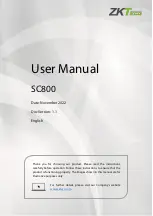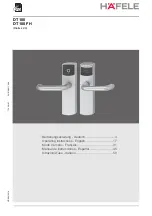
CHAPTER 15 Media
Mediant 4000 SBC | User's Manual
c.
The device detects the beep of an answering machine and sends an INFO message to the
remote party:
INFO sip:[email protected];user=phone SIP/2.0
Via: SIP/2.0/UDP 10.33.2.53;branch=z9hG4bKac5906
Max-Forwards: 70
From: "anonymous" <sip:[email protected]>;tag=1c25298
To: <sip:[email protected];user=phone>
Call-ID: [email protected]
CSeq: 1 INVITE
Contact: <sip:[email protected]>
X- Detect: Response=AMD,CPT
Content-Type: Application/X-Detect
Content-Length: xxx
Type = CPT
Subtype = Beep
Answering Machine Detection (AMD)
The device's Answering Machine Detection (AMD) feature can detect whether an outbound call has
been answered by a human (including fax) or an answering machine. The device analyzes the
sound (speech) patterns received in the first few seconds of the call to determine whether a human
(live person) or machine has answered the call. Typically, when a human answers the call, there is
a short "hello ..." followed by silence to wait for the other party to respond. In contrast, when an
answering machine answers the call, there is constant speech (answering message) followed by a
beep to leave a voice-mail message.
When the device detects what answered the call (human or machine), it can notify this detection
type to, for example, a third-party application server used for automatic dialing applications. The X-
Detect SIP header is used for requesting event detection and notification. For more information,
see
Event Detection and Notification using X-Detect Header
. The device can also detect beeps
played by an answering machine at the end of its greeting message. For more information, see
Detecting Answering Machine Beeps
.
The device's default AMD feature is based on voice detection for North American English (see note
below). It uses sophisticated speech detection algorithms which are based on hundreds of real-life
recordings of answered calls by live voice and answering machines in English. The algorithms are
used to detect whether it's human or machine based on voice and silence duration as well as
speech patterns. The algorithms of the language-based recordings are compiled into a file called
AMD Sensitivity. This file is provided by default, pre-installed on the device.
As the main factor (algorithm) for detecting human and machine is the voice pattern and
silence duration, the language on which the detection algorithm is based, is in most
cases not important as these factors are similar across most languages. Therefore, the
default, pre-installed AMD Sensitivity file, which is based on North American English,
may suffice your deployment even if the device is located in a region where a language
other than English is used.
However, if (despite the information stated in the note above) you wish to implement AMD in a
different language or region, or if you wish to fine-tune the default AMD algorithms to suit your
specific deployment, please contact the sales representative of your purchased device for more
information on this service. You will be typically required to provide AudioCodes with a database of
recorded voices (calls) in the language on which the device's AMD feature can base its voice
detector algorithms. The data needed for an accurate calibration should be recorded under the
following guidelines:
- 176 -
Summary of Contents for Mediant 4000 SBC
Page 1: ...User s Manual AudioCodes Series of Session Border Controllers SBC Mediant 4000 SBC Version 7 2...
Page 40: ...Part I Getting Started with Initial Connectivity...
Page 48: ...Part II Management Tools...
Page 113: ...Part III General System Settings...
Page 118: ...Part IV General VoIP Configuration...
Page 525: ...Part V Session Border Controller Application...
Page 654: ...Part VI Cloud Resilience Package...
Page 663: ...Part VII High Availability System...
Page 685: ...Part VIII Maintenance...
Page 759: ...Part IX Status Performance Monitoring and Reporting...
Page 844: ...Part X Diagnostics...
Page 888: ...Part XI Appendix...
















































